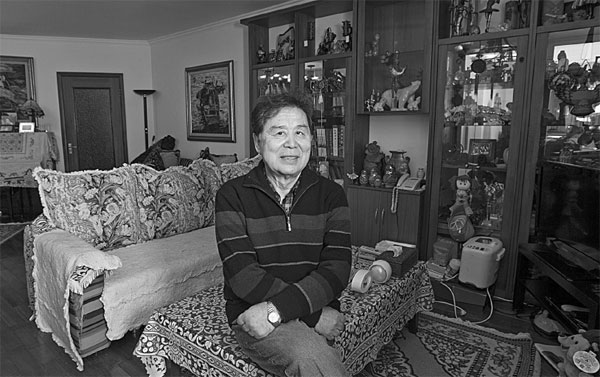Keeping in step with the shanghai beat
Updated: 2015-01-16 07:12
By Cui Jia(China Daily)
|
|||||||||||
Although he was born in the Xinjiang Uygur autonomous region, Hamut Mehmut has become a fixture on the national arts scene, as Cui Jia reports from Shanghai.
This is the first in a series of reports about people from the Xinjiang Uygur autonomous region who have chosen to settle in other parts of China. More reports will follow.
As someone who speaks the Shanghai dialect fluently and has lived in the city for more than 55 years, Hamut Mehmut calls himself Shanghainese. "At the same time, my identity as a Uygur has always motivated me to excel, because I don't want people to say Uygurs can't do well," the former head of the Shanghai Ballet said.
The 69-year-old was both angered and saddened when he heard that police in the Xinjiang Uygur autonomous region had shot and killed six people suspected of attempting to detonate explosives in a commercial district of Shule county, Kashgar prefecture, on Monday.
He reacts the same way whenever incidents of this kind occur in the region which has a large Muslim population, some of whom have been radicalized. "I really hate religious extremism. It's like an evil cult. I feel sad for people, especially young people, who fall for it and lose their lives. Most of them are poorly educated."
Hamut said the violent attacks, most of which have been linked with extremism, have changed the public's perception of Uygurs. "Before, people cared for and respected people from Xinjiang, from the far west of China. Now we're often seen as thieves and terrorists," he said. "People ignore the 99 percent of Xinjiang people who are friendly, and only focus on the 1 percent who are the common enemy of all Chinese people. That hurts."
People need to unite in the face of a common danger, he said, and tarring all Xinjiang people with same brush will simply create unnecessary conflicts. "I understand why tight security is imposed on people from Xinjiang at airports, but it shouldn't be done with a bad attitude. I was once questioned aggressively for more than 10 minutes in front of dozens of ballet dancers when I was leading the team on an overseas tour," he said. "Why couldn't the customs guy be polite to me in front of the troupe?"
Although Hamut's ethnic identity never makes him feel different to others, incidents like the one at the airport are a constant reminder that he's from Xinjiang, and he's concerned that they could be used to fuel discontent. "Extremists or terrorists might say: 'Look how badly the government treats you.'"
The urge to help
Hamut is determined to do everything he can to help Xinjiang people settle in Shanghai, and to heighten awareness among the locals. The urge to help is something he attributes to the influence of his father, Mehmut Ahadi.
In 1936, Mehmut, then 16, was chosen to study math and science with teachers from the Soviet Union. He later became one of the first science teachers in Xinjiang - at the time schools in the region only taught the Quran - and was headmaster of a primary school in Hami prefecture.
After Sheng Shicai, a warlord who ruled Xinjiang between 1933 and 1944, turned against the Soviet Union in 1942, Mehmut, who was believed to be close to the USSR, was frequently questioned and harassed by the police.
One day, he fled on a horse, carrying only a large sack of raisins, and headed for Shanghai, which was under the control of the Communisit Party of China. He had to leave his wife, who was pregnant with Hamut, but she and Hamut managed to jon him when the boy was 6.
Mehmut's deep knowledge of Islam led to his appointment as a member of Shanghai's Ethnic Affairs Committee in 1953. Hamut still proudly holds the "family jewels", the letters of appointment signed by premier Zhou Enlai.
"My father has become an influential figure in ethnic issues, and is repected by the Xinjiang people because he stood up for them," Hamut said.
During a time of extreme food shortages, Mehmut persuaded the Shanghai government to allow Xinjiang people to use markets that were usually only open to expats, and also suggested the construction of a cemetery for Muslims.
Hamut originally wanted to be a pilot, but a fine singing voice led to him becoming a student at the Shanghai Conservatory of Music in 1965. He headed the Shanghai Ballet for 16 years, and now dreams of Xinjiang having its own company. "Xinjiang people sing and dance from the heart, so they could be the best ballet dancers in China," he said, motioning to a video on his cellphone showing Uygur children dancing at a wedding in Xinjiang.
Now retired, he likes to spend time with a new generation of Xinjiang people in Shanghai who've received higher education and earned respect by their achievements. "Gradually, they will help to change people's views, and become the new face of Xinjiang."
Contact the writer at cuijia@chinadaily.com.cn

|
Hamut Mehmut, former head of the Shanghai Ballet, wants to do everything he can to help Xinjiang people settle in Shanghai. Gao Erqiang / China Daily |
(China Daily 01/16/2015 page5)
Today's Top News
Belgian police kill two in raid on suspected Islamists
Chinese fleet brings out the crowds in visit to Britain
US, German leaders urge implementation of ceasefire deals in eastern Ukraine
Obama hosting UK's David Cameron for working dinner
Keeping in step with the shanghai beat
The Uygur who puts the accent firmly on Beijing
Thai railway project to commence in September
Italian president resigns
Hot Topics
Lunar probe , China growth forecasts, Emission rules get tougher, China seen through 'colored lens', International board,
Editor's Picks

|

|

|

|

|

|






